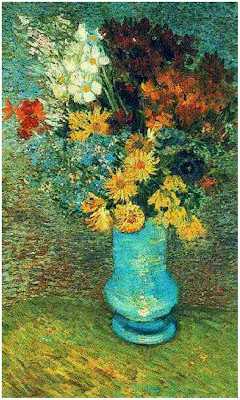 |
| Van Gogh Vase With Flowers Painting |
Van Gogh"s Use Of Complimentary Colors by Jill Saur
Title: "Vase With Daisies And Anemones"
Painted In Paris In The Summer Of 1887This oil on canvas by Van Gogh is rendered with stunning complementary colors (colors that are opposites on the color wheel). In this case, the opposites are blue and orange, purple and yellow, and red and green. In color theory, this combination of colors is known as a six tone chord (hexagon).
Van Gogh was a master of color, drawing, and composition. He knew how to use just the right amount of a colors compliment to enhance the original hue.
I've always been intrigued by color and have experimented with it, but it wasn't until about fifteen years ago, that the secrets of those hues began opening up to me. I spent many long hours and months studying and making color charts and complex color wheels. Learning the difference between warm blues and cool blues, warm reds and cool reds, warm yellows and cool yellows, made all the difference in the world!
I teach my students how to make their own color wheel. I love to see when the light goes on and they understand what it's all about. Realizing how to mix color without having it turn to mud, knowing how to tone down a color without using black, and knowing how to choose the right colors for a painting, is a game changer! - Jill Saur - Jill Saur Fine Art
If you're interested in my painting classes, please send me an email. CLICK HERE